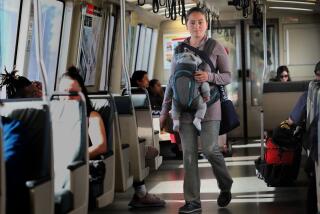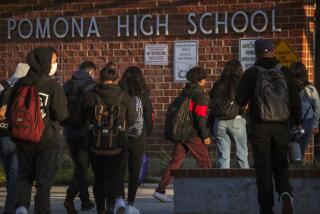What would a universal basic income mean for America? Stockton thinks it has the answer
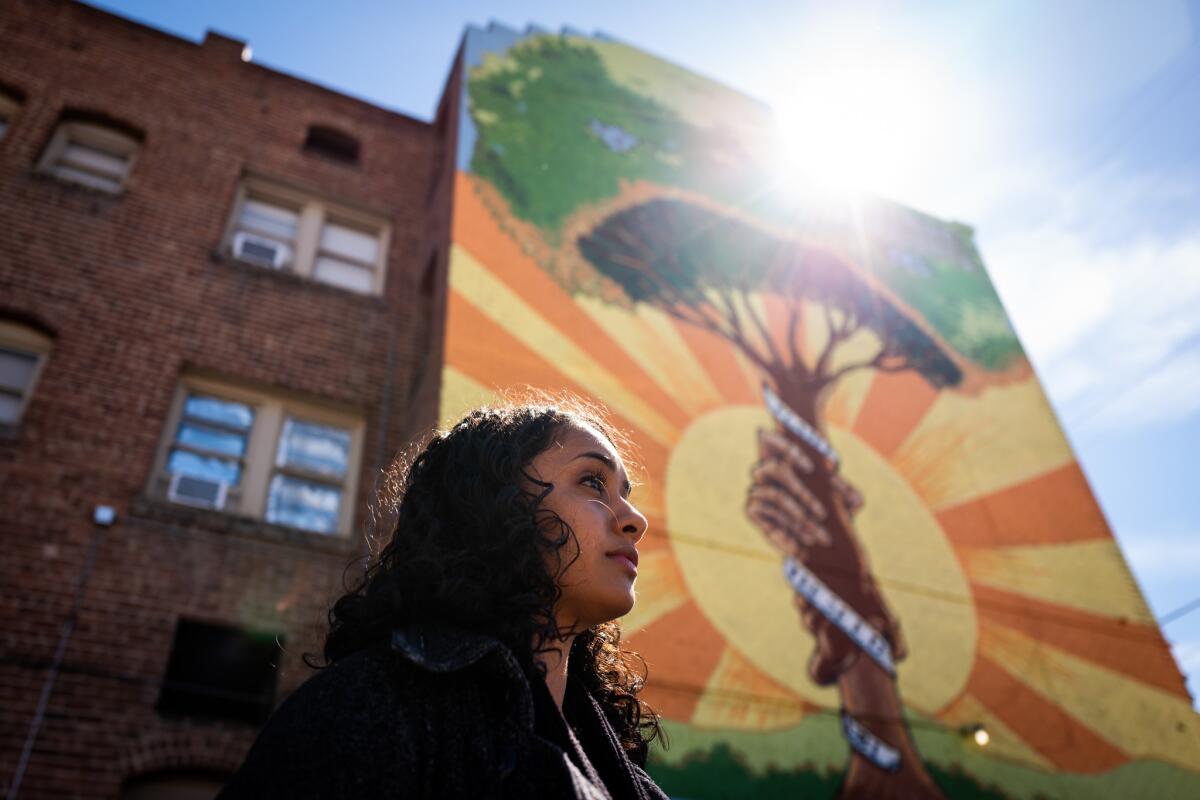
- Share via
Reporting from SACRAMENTO — Young, sincere and raised on the edge of poverty, Sukhi Samra has a mother who worked two minimum-wage jobs when she was a kid — days at a gas station and nights at a Subway. Her father is disabled. She knows what an extra $500 a month would have bought her family.
“I spent a lot of 5th and 6th grade just, like, in those tables at Subway so that I could keep my mom some company and spend some time with her,” Samra said. “Five hundred a month would have meant that my mom spent a couple more hours at home with us every night.”
At 23, Samra is now head of the Stockton Economic Empowerment Demonstration, a pilot program to test a universal basic income. For the next year and a half, 130 residents of this struggling Central Valley city will get $500 every month, with no strings — such as employment or sobriety requirements — attached, in a social experiment that is as much public relations as rigorous research.
Although its organizers have promised transparency, so far, much of the program has been a closely guarded secret. The identities of the recipients have remained confidential while organizers plan a media strategy. Multiple requests by The Times to conduct interviews were denied.
Still, what happens in Stockton is likely to inform the national political conversation in the years ahead. Universal basic income — also called guaranteed income — has become an unexpected topic among presidential candidates, as economic anxiety and income inequality continue to plague voters on both sides of the political spectrum.
The pilot program also could create a road map for implementing future basic income policies in other cities or on a national scale.
“We are in a moment where big ideas are important and politically people are ready for them,” said Natalie Foster, co-chair of The Economic Security Project, a Silicon-Valley organization that provided $1 million in initial funding for the $3.1 million program. “The stories coming out of Stockton will put a real name and a face on what that economic insecurity looks like and what it looks like to make a different political decision.”
Even though it is early in the campaign, almost every Democratic presidential candidate has been asked about basic income and about reparations — compensation paid to African Americans for the generational effects of slavery.
Sen. Kamala Harris, the front-runner from California, has tiptoed up to the edge of basic income with a “livable incomes” proposal that would target working families making up to $100,000 with a monthly cash grant. Pete Buttigieg, the mayor of a college town in Indiana, called universal basic income an idea “worth taking seriously.” Longshot candidate Andrew Yang has made it the centerpiece of his run.
Stockton Mayor Michael Tubbs said he has had “many touch points” with Harris since the inception of the Stockton program. He said he has also been in contact with Ras Baraka, the mayor of Newark, N.J., and Ameya Pawar, an alderman in Chicago, both cities that are exploring their own experiments with guaranteed income.
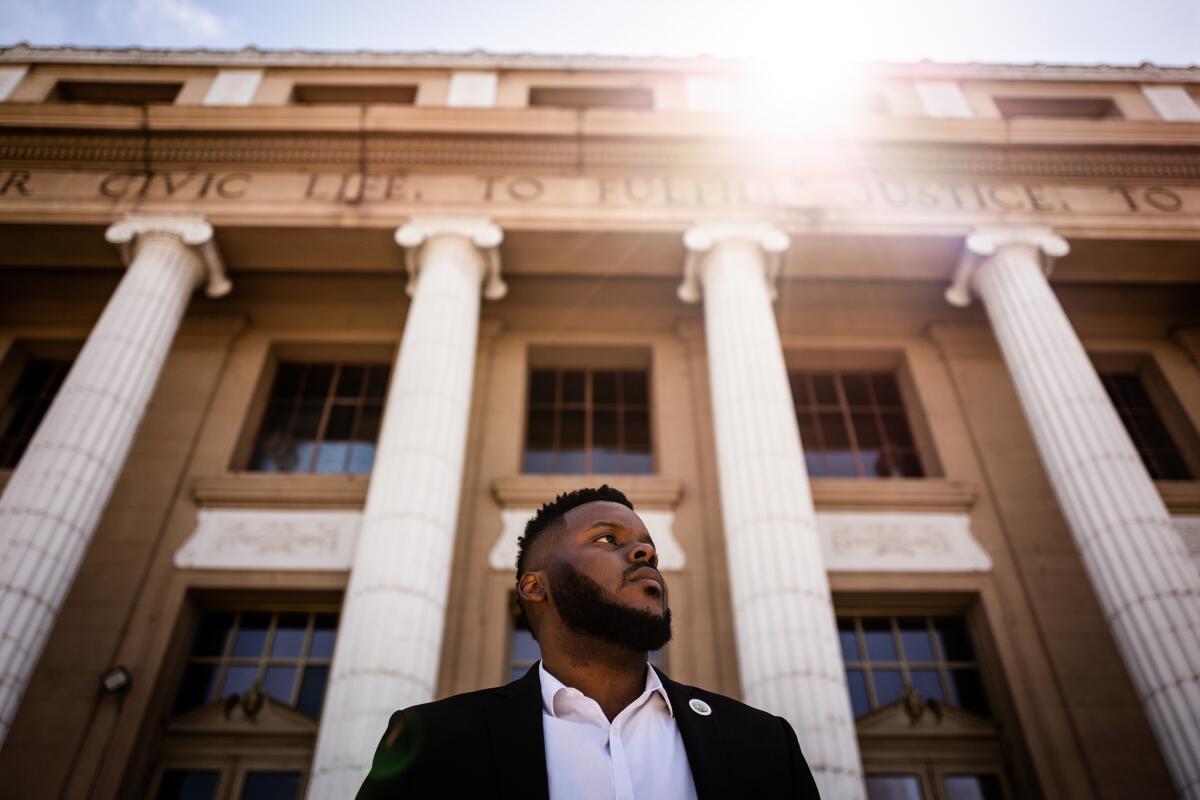
“I’m really happy to have other people lifting this up,” Tubbs said. “My hope was it would start a national conversation.”
The idea of a universal basic income has been floated alongside the equally controversial notion of reparations. Reparations would be different from basic income because it would involve an explicit acknowledgment of harm alongside government payments.
Sen. Elizabeth Warren of Massachusetts and former Rep. Beto O’Rouke of Texas, both Democrats who are running for president, have vowed to back legislation forming a committee to study reparations. Sen. Cory Booker of New Jersey last week announced he would introduce legislation to do just that.
The Stockton program doesn’t involve reparations, but it could provide insight on that, too. While the overall poverty rate is about 22% in Stockton, the poverty rate among blacks is 35%.
Dorian Warren, who co-founded the Economic Security Project with Foster and Facebook founder Chris Hughes, called basic income and reparations “the two least popular ideas” in American politics. But “if it expands the sense of what’s possible,” Warren said, “then indirectly, sure, it could lead to a different conversation about reparations because they are both ideas that seem so out there and crazy and not American.”
The first universal basic income payments in Stockton were distributed on debit cards in February. By the end of April, Samra expects to share tales from recipients, maybe similar to her own, of how that no-strings-attached cash was spent by a carefully selected group who have been dubbed “storytellers” for the program.
Final research results won’t be available for a couple of years, but by taking the unusual approach of asking some recipients to regularly chronicle their experiences for the public, backers hope to quickly demonstrate what a guaranteed income can do. They are betting personal stories will resonate more than statistics and graphs.
“We have a real opportunity to rethink how we talk abut the safety net, what it means to get by, and we want to take advantage of that,” said Amy Castro Baker, an assistant professor at the University of Pennsylvania and one of the principal researchers. “I would argue that research is always informed by something that you would like to see happen or not happen in the world, and we are owning that.”
Castro Baker said storytelling is “absolutely not” part of a regular research study. She said the experiences of the 25 storytellers might not be included in the final report if the data gathered from them seems skewed, and that the researchers are not involved in the effort to gather anecdotes.
Samra said the storytellers were selected based on a review of interviews with the recipients by a panel that included her, members of the Economic Security Project and others.
Data from another 100 recipients, whose identities will remain confidential, will make up the bulk of the research. Five other participants are backups in case others drop out over a catastrophic illness, otherwise known as “medical attrition,” Castro Baker said. The final report will likely come in 2021, she said, though some information will be released as early as this fall and on an ongoing basis via an online “dashboard” that will provide information requested by Stockton residents.
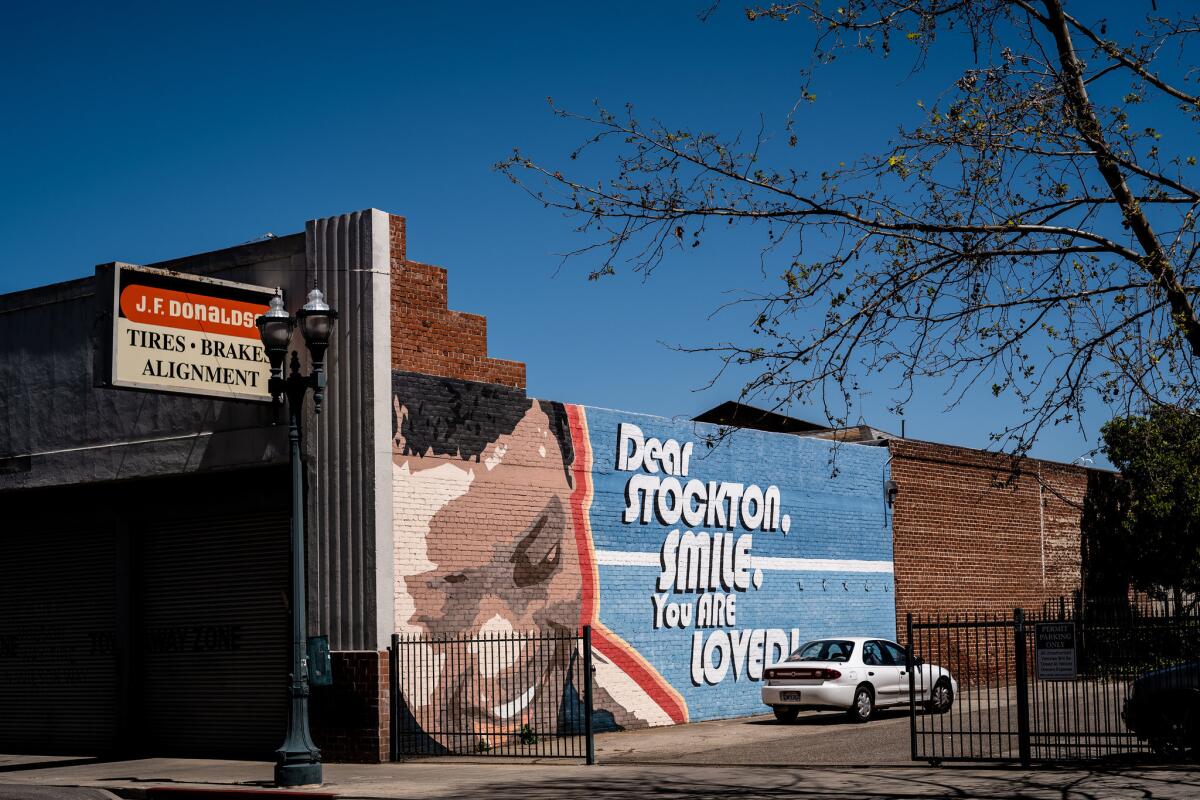
For Tubbs, his support of basic income is as much personal as political. Although the pilot program is often described as a city effort, it’s actually a collaboration between Tubbs and private partners with the Stockton Economic Empowerment Demonstration. Samra worked for Tubbs before sliding over to run the project.
Tubbs grew up poor in Stockton, and lived in many of the same neighborhoods where the program is being rolled out — places where the median household income is below $46,033, more than $20,000 less than the state average, according to census figures. The city was decimated by the housing crisis in 2008 and has struggled to recover.
“I know what it’s like to be hungry or to see your mom struggling. Everyone in my neighborhood was always outside playing because their parents were working. And they weren’t at home waiting for the government to save them,” the mayor said. “I think I have a special responsibility to elevate policy and solutions that can deal with these issues, but also to change these caricatures we have of people who are no different than anyone else. Who happen to work in jobs that don’t pay well.”
Though controversial, the support for basic income spans the political spectrum. On the right, it’s a way to streamline the welfare state. On the left, it’s a way to address economic inequity.
Silicon Valley has its own hotbed of believers, born, in part, out of technocratic guilt — or foresight, depending on who is answering the question. They see basic income as a way to keep society from collapsing if the robots they are building and the artificial intelligence they are coding eventually combine to take over most jobs now performed by humans.
Many in organized labor see that particular reasoning as detrimental for average people, potentially causing the very societal breakdown proponents of basic income say they are trying to avert.
“This concept of universal basic income is a surrender to a kind of grim Dickensian view of the future, frankly, in which people are robbed on the dignity of work,” said Barry Broad, chair of the California’s Employment Training Panel, which supports job creation and retention. “It’s naive to think universal basic income is going to pay the bills. It’s going to at best give people a poverty wage.”
Steve Smith, spokesman for the California Labor Federation, said unions are skeptical of the motives behind programs such as the one in Stockton. He called it “disturbing” that the storytellers have been screened.
“We view these pilot experiments like Stockton as a public relations mechanism for the concept of universal basic income, nothing more,” Smith said. “When you are talking about giving people free money and then measuring what happens in their lives, I think it’s common sense that their lives are going to get better.”
Smith and Broad both said the focus should be on universal health care, making college affordable and other equity issues.
“I just think we can do better, a lot better,” said Broad. “What is society’s responsibility to creating productive lives?”
The Stockton program won’t provide a complete answer to that question, but the stories from it likely will help Americans put themselves in the shoes of a basic income recipient.
“I was moved by … the amount of relief folks felt from getting the additional $500 dollars,” Samra said, recounting initial stories from recipients. “It all goes back to my mother.”
More to Read
Sign up for Essential California
The most important California stories and recommendations in your inbox every morning.
You may occasionally receive promotional content from the Los Angeles Times.

